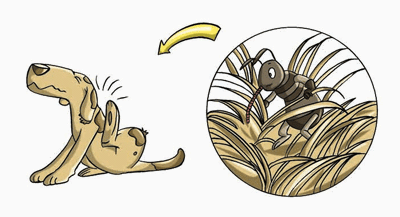epi-, ep-
(Greek: above, over, on, upon; besides; in addition to; toward; among)
An agent destructive to or which kills epizoa: Greg read about an epizoicide that was supposed to get rid of the fleas on his dog.
epizoochore
1. Dispersed by attachment to the surface of animals of visid (sticky), barbed, or hooked seeds or fruits.
2. Any spore, seed, or organism that is dispersed by being carried upon the body of an animal.
2. Any spore, seed, or organism that is dispersed by being carried upon the body of an animal.
The study of the patterns of infectious disorders of animal groups; epizootiology: Part of Mary's studies at the university included epizoology, or scientific research regarding the frequency, distribution, and causation of diseases in an animal population.
An animal organism that lives on the surface of a host animal; ectozoon: Fleas are external parasites and are known to be epizoa because they obtain nourishment from the host, as a dog, without killing it.


A disease caused by an animal parasite in or on the skin; epidermatozoonosis: On the farm, Sam noticed that one of his cows had an infected area which the vetinarian diagnosed as epizoonosis and which was treated quickly.
A disease occurring simultaneously in animal groups: When the epizootic of the swine flu broke out, Jane compared it to an epidemic when a huge number of people suffer from the flu at the same time.
The science pertaining to the factors relating to the development and spread of animal disorders: Epizootiology deals with the frequency, distribution, and causation of diseases in an animal population.
eponym
1. Someone who gives, or is supposed to give, his/her name to a people, place, or institution; e.g. among the Greeks, the heroes who were looked upon as ancestors or founders of tribes or cities. Also in Latin form eponymus.
2. A name from which another name or word is derived; such as, "sandwich" coming from The Earl of Sandwich and "Rome" which is derived from Romulus.
3. The name of a method, test, etc., which is based on the name of a person connected with it in some way.
2. A name from which another name or word is derived; such as, "sandwich" coming from The Earl of Sandwich and "Rome" which is derived from Romulus.
3. The name of a method, test, etc., which is based on the name of a person connected with it in some way.
eponymic
1. Being or relating to or bearing the name of an eponym.
2. A reference to something named after someone.
2. A reference to something named after someone.
For example, a condition called Sherman's syndrome might be named after someone named Sherman, who discovered it, or described and clearly delineated it.
eponymy
1. Derivation of a name of a city, country, era, institution, or other place or thing from that of a person.
2. The name of a person, whether real or fictitious, who has (or is thought to have) given rise to the name of a particular place, tribe, era, discovery, or other item.
2. The name of a person, whether real or fictitious, who has (or is thought to have) given rise to the name of a particular place, tribe, era, discovery, or other item.
eponyous
epornithic
epornithology
funiculoepididymitis
Inflammation of the spermatic cord and the epididymis.
An attack of intense anger occasionally occurring in a person's epilepsy: The furor epilepticus usually happens without any apparent reason, can take place anywhere, and surprises other people who are present.
Related "above, over, beyond the normal, excessive" word units: hyper-; super-, supra-, sur; ultra-, ult-.


